Redis基础类型ZSet增删改查(带Java库源码)
1 缘起
继续系统补充Redis基础数据类型操作知识。
为帮助读者更加系统地学习Redis基础数据操作,
分享其他数据类型操作文章:
| 序号 | 文章 |
|---|---|
| 1 | String操作详解 |
| 2 | Hash操作详解 |
| 3 | List操作详解 |
| 4 | Set操作详解 |
Redis进阶:图文讲解Redis底层数据结构之embstr,raw,ziplist,quicklist和hashtable (带源码讲解)
注意:
(1)文末附全部测试代码;
(2)本篇文章将学习使用如下函数(方法):
| 序号 | 操作 | method |
|---|---|---|
| 1 | 新增 | zadd,zinterstore |
| 2 | 删除 | zrem,zremrangeByRank,zremrangeByScore |
| 3 | 修改 | zincrby |
| 4 | 查询 | zrange,zrangeByScore |
2 Zset测试
Redis基础数据类型ZSet是set的另一种形式,比set的多了一个分数属性,
可以通过分数操作相关数据,比如按照分数范围查询数据,按照分数排序,
这也催生了skiplist的应用。
本文采用连接池的方式直连Redis,连接池配置如下:
- 依赖
<dependency>
<groupId>redis.clientsgroupId>
<artifactId>jedisartifactId>
<version>3.5.1version>
dependency>
- Redis连接池配置(可以根据需要设置为共用)
private static JedisPool getJedisPool() {
JedisPoolConfig jedisPoolConfig = new JedisPoolConfig();
// Jedis池:最大连接数
jedisPoolConfig.setMaxTotal(1);
// Jedis池:最大空闲连接数
jedisPoolConfig.setMaxIdle(10);
// Jedis池:等待时间
jedisPoolConfig.setMaxWaitMillis(3000);
// Jedis池:连接Redis超时时间
int connectTimeout = 2000;
String redisHost = "127.0.0.1";
int redisPort = 6379;
String redisPassword = "123456";
int redisDb = 0;
// 创建连接池
return new JedisPool(jedisPoolConfig, redisHost, redisPort, connectTimeout, redisPassword, redisDb);
}
2.1 新增数据
zset新增数据有两种方式:直接新增以及取交新增。
其中,直接新增有:单条新增和批量新增;
取交新增是取两个zset的交集,新增到新的zset中。
2.1.1 直接新增:zadd
单条新增是通过key、score和value方式进行;
批量新增是通过key,map(数据的score和value映射)进行。
测试样例如下:
/**
* 新增数据.
*/
@Test
public void insertData() {
try (Jedis jedis = getJedisPool().getResource()) {
// 单条插入:带分数
Long res1 = jedis.zadd("zsetziplist", 2, "xiaohua");
Long res2 = jedis.zadd("zsetziplist", 1, "xiaolan");
Long res3 = jedis.zadd("zsetziplist", 3, "xiaoti");
Map<String, Double> scoreMembersMap = new HashMap<>();
scoreMembersMap.put("xiaohei", 0.1);
scoreMembersMap.put("xiaobai", 0.02);
scoreMembersMap.put("xiaoniu", 0.5);
// 批量插入:带分数
Long res4 = jedis.zadd("zsetziplist", scoreMembersMap);
logger.info(">>>>>>>>插入zset:{}, {}, {}, {}", res1, res2, res3, res4);
} catch (Exception ex) {
logger.error(">>>>>>>>>插入zset异常", ex);
throw new RuntimeException(ex);
}
}
单条新增的源码如下图所示,
由图可知,时间复杂度为 O ( l o g ( N ) ) O(log(N)) O(log(N)),当在某个zset中不存在添加的数据时,则新增,
若存在,则更新当前value的分数(score),如zset a,在a中添加数据:(xiaohua,1),
如果a中不存在该数据,则新增该数据到a中,
如果a中已存在(xiaohua, 0),则更新xiaohua的值为1。
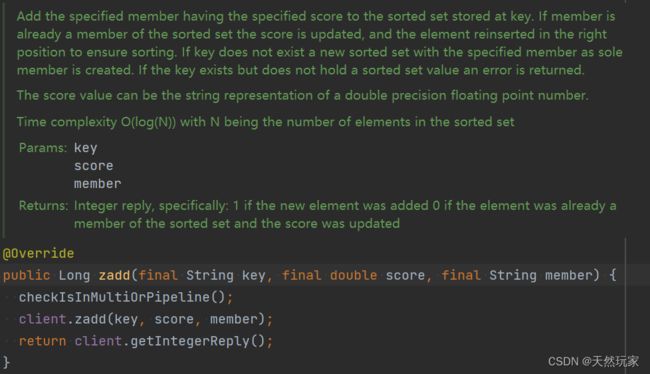
当然,Redis库提供了批量添加数据的方式,
将value和score映射存储到Map中,一次性存储,
源码如下图所示,没有注释,不过按照测试结果可知,是通过Map添加数据。

2.1.2 取交集新建集合:zinterstore
既然zset是变种的集合,当然有交集的概念,
zset取多个zset的交集可以新建zset,
如zset a和zset b,取a和b的交集,生成新的zset c,
c的中value的score为a和b中对应value score的和。
同时,zinterstore提供了按照权重聚合方法,
使用ZParams的weights的方法,为对应zset score提供权重值,
即合并前,每个zset的score先乘以权重,然后在取交集,求和,
其中,ZParams中权重的数量应与待取交集的zset数量一致,为每个zset提供一个权重。
测试样例如下:
/**
* 取交集,新建集合.
*/
@Test
public void unionAndCreateZSetData() {
try (Jedis jedis = getJedisPool().getResource()) {
Map<String, Double> scoreMembersMap = new HashMap<>();
scoreMembersMap.put("xiaohei", 0.1);
scoreMembersMap.put("xiaobai", 0.02);
scoreMembersMap.put("xiaoniu", 0.5);
Map<String, Double> scoreMembersMap1 = new HashMap<>();
scoreMembersMap1.put("xiaohei", 0.21);
scoreMembersMap1.put("xiaobai", 0.05);
scoreMembersMap1.put("xiaobu", 0.5);
// 批量插入:带分数
Long res1 = jedis.zadd("zsetziplist-1", scoreMembersMap);
Long res2 = jedis.zadd("zsetziplist-2", scoreMembersMap1);
// 取zset:zsetziplist-1, zsetziplist-2;交集,新建zset:zsetziplist-union
Long res3 = jedis.zinterstore("zsetziplist-union", "zsetziplist-1", "zsetziplist-2");
Map<String, Double> scoreMembersMap3 = new HashMap<>();
scoreMembersMap3.put("xiaohei", 0.1);
scoreMembersMap3.put("xiaobai", 0.02);
scoreMembersMap3.put("xiaoniu", 0.5);
Map<String, Double> scoreMembersMap4 = new HashMap<>();
scoreMembersMap4.put("xiaohei", 0.21);
scoreMembersMap4.put("xiaobai", 0.05);
scoreMembersMap4.put("xiaobu", 0.5);
// 批量插入:带分数
Long res4 = jedis.zadd("zsetziplist-3", scoreMembersMap3);
Long res5 = jedis.zadd("zsetziplist-4", scoreMembersMap4);
// 使用weight
ZParams zParams = new ZParams();
zParams.weights(3, 5);
Long res6 = jedis.zinterstore("zset-weight", zParams, "zsetziplist-3", "zsetziplist-4");
logger.info(">>>>>>>>插入zset:{}, {}, {}, {}, {}, {}", res1, res2, res3, res4, res5, res6);
} catch (Exception ex) {
logger.error(">>>>>>>>>插入zset异常", ex);
throw new RuntimeException(ex);
}
}
zinterstore源码如下图所示,
由源码可知,时间复杂度为 O ( n ) + O ( m l o g m ) O(n)+O(mlogm) O(n)+O(mlogm),其中,n为待取交集的set集合的数据量,m为结果集合的数据量。
取交集的过程中,如果使用带权重的方法,合并前会先将zset中的score先乘以权重,
然后再合并求和。
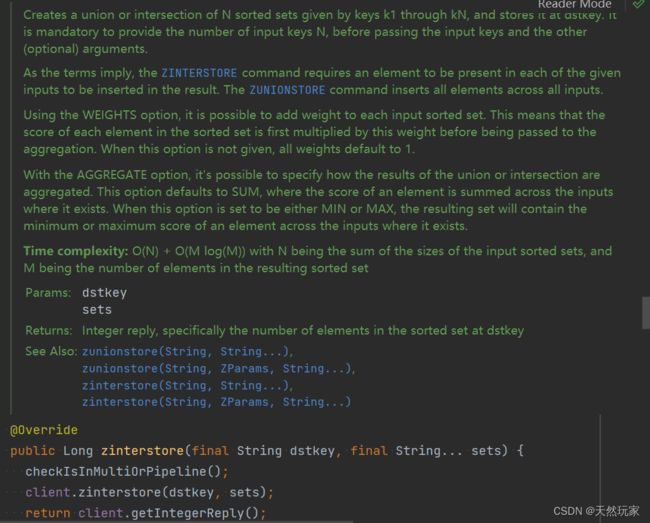
2.2 删除数据
zset删除数据数据有三种方式:
(1)直接删除:zrem;
(2)按照顺序批量删除:zremrangeByRank;
(3)按照score范围删除:zremrangeByScore;
测试样例如下:
/**
* 删除数据.
*/
@Test
public void deleteData() {
try (Jedis jedis = getJedisPool().getResource()) {
// 删除指定数据
Long res1 = jedis.zrem("zsetziplist", "xiaobai");
// 根据索引范围删除数据
Long res2 = jedis.zremrangeByRank("zsetziplist", 0, 1);
// 根据score范围删除数据
Long res3 = jedis.zremrangeByScore("zsetziplist", 0, 2);
logger.info(">>>>>>>>删除:{}, {}, {}", res1, res2, res3);
} catch (Exception ex) {
logger.error(">>>>>>>>>Redis zset删除异常", ex);
throw new RuntimeException(ex);
}
}
2.2.1 zrem
直接删除源码如下,由源码可知,
时间复杂度为 O ( l o g n ) O(logn) O(logn),zset中有该值,则按照对应的数据删除,没有则不操作。
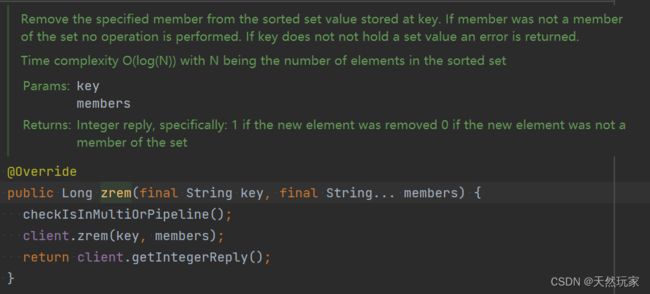
2.2.2 zremrangeByRank
按照数据排序批量删除源码如下,
由于zset的数据是按照score排序存储的,
因此,天然可以按照排名批量删除数据。
有源码可知,时间复杂度为 O ( l o g n ) + O ( m ) O(logn)+O(m) O(logn)+O(m),其中,n为zset的原始数据数量,m为删除元素的数量。
排序范围:[0,n],当然,也可为负数,倒序删除。
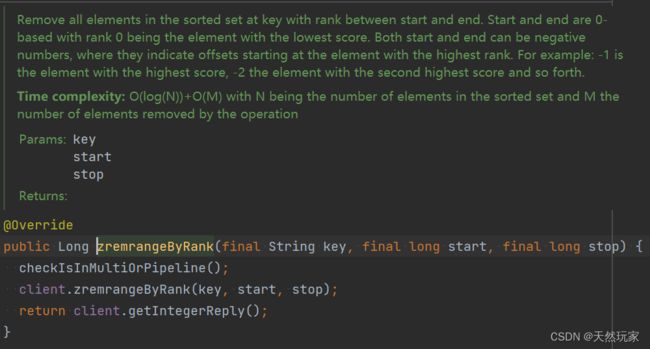
2.2.3 zremrangeByScore
根据score范围删除,也是zset的一个天然方法,
源码如下图所示,由源码中,时间复杂度为 O ( l o g n ) + O ( m ) O(logn)+O(m) O(logn)+O(m),其中,其中,n为zset的原始数据数量,m为删除元素的数量。
score范围比较随意,按照需要填写即可。
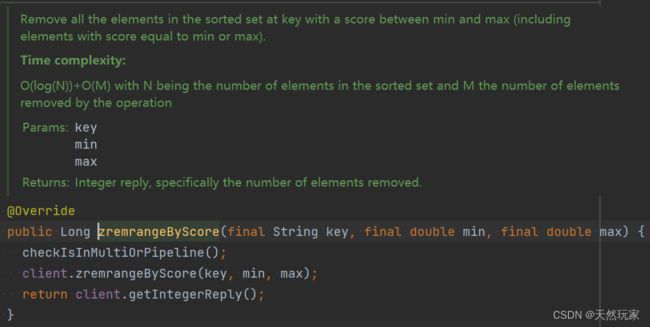
2.3 修改数据
Redis的set是没有修改操作的,因为,set只存储value,
而zset当然也不支持修改value,这里的修改数据,是修改score,
测试样例如下:
/**
* 修改数据.
*/
@Test
public void editData() {
try (Jedis jedis = getJedisPool().getResource()) {
// 修改score
Double res1 = jedis.zincrby("zsetziplist", 1, "xiaoniu");
logger.info(">>>>>>>>编辑:{}, {}", res1);
} catch (Exception ex) {
logger.error(">>>>>>>>>Redis zset编辑异常", ex);
throw new RuntimeException(ex);
}
}
修改score源码如下图所示,
由源码知,时间复杂度为 O ( l o g n ) O(logn) O(logn),
修改zset某个value的score时,如果value存在,则直接修改,
如果不存在value,则新增该数据。
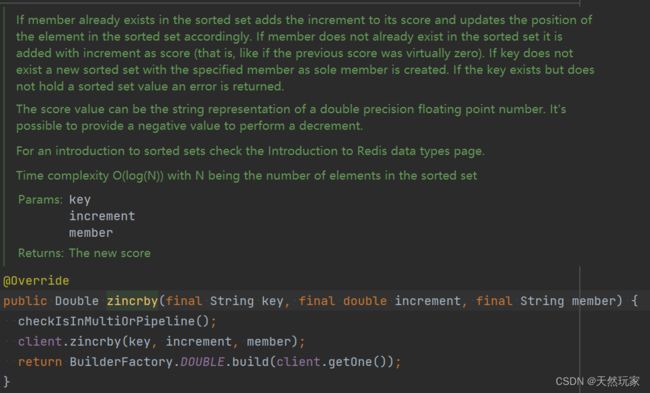
2.4 查询数据
查询zset数据,由于zset特有的数据设计,
有两种常用的查询方式:
(1)根据索引查询:zrange;
(2)根据分数范围查询:zrangeByScore;
测试样例如下:
/**
* 查询数据.
*/
@Test
public void queryData() {
try (Jedis jedis = getJedisPool().getResource()) {
// 指定索引范围查询
Set<String> res1 = jedis.zrange("zsetziplist", 0, 1);
// 根据分数范围查询
Set<String> res2 = jedis.zrangeByScore("zsetziplist", 2, 3);
logger.info(">>>>>>>>查询zset:{},{}", res1, res2);
} catch (Exception ex) {
logger.error(">>>>>>>>>Redis zset查询异常", ex);
throw new RuntimeException(ex);
}
}
2.4.1 zrange
根据索引范围查询,源码如下图所示,
由源码知没有注释,按照测试结果,
zrange是根据索引范围查询。

2.4.2 zrangeByScore
zset的设计有score这个属性,
当然不能浪费,查询时按照分数范围查询
源码如下图所示,由源码知,时间复杂度为 O ( m ) O(m) O(m),
score范围是闭区间匹配,该方法类似于SQL的LIMIT语句。
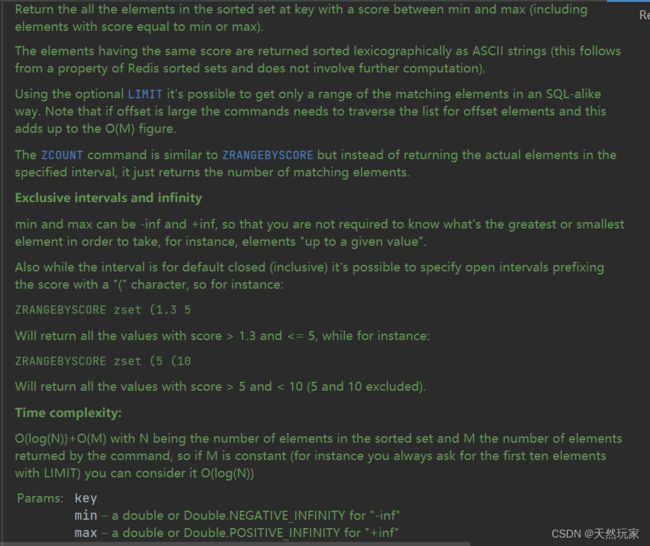
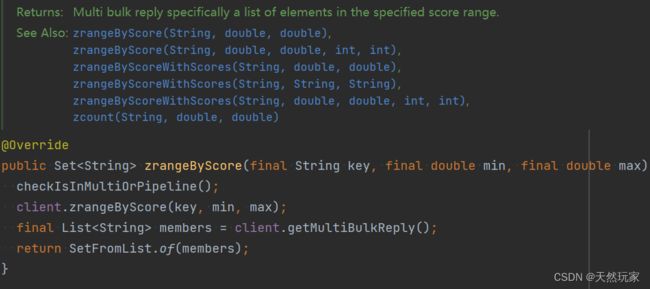
3 小结
zset增删改查汇总:
| 序号 | 操作 | method |
|---|---|---|
| 1 | 新增 | zadd,zinterstore |
| 2 | 删除 | zrem,zremrangeByRank,zremrangeByScore |
| 3 | 修改 | zincrby |
| 4 | 查询 | zrange,zrangeByScore |
为帮助读者更加系统地学习Redis基础数据操作,
分享其他数据类型操作文章:
| 序号 | 文章 |
|---|---|
| 1 | String操作详解 |
| 2 | Hash操作详解 |
| 3 | List操作详解 |
| 4 | Set操作详解 |
Redis进阶:图文讲解Redis底层数据结构之embstr,raw,ziplist,quicklist和hashtable (带源码讲解)
附件
package database_test.redis_test;
import org.junit.Test;
import org.slf4j.Logger;
import org.slf4j.LoggerFactory;
import redis.clients.jedis.Jedis;
import redis.clients.jedis.JedisPool;
import redis.clients.jedis.JedisPoolConfig;
import java.util.HashMap;
import java.util.Map;
import java.util.Set;
/**
* zset测试.
*
* @author xindaqi
* @since 2022-08-18 15:31
*/
public class ZSetTest {
private static final Logger logger = LoggerFactory.getLogger(ZSetTest.class);
private static JedisPool getJedisPool() {
JedisPoolConfig jedisPoolConfig = new JedisPoolConfig();
// Jedis池:最大连接数
jedisPoolConfig.setMaxTotal(1);
// Jedis池:最大空闲连接数
jedisPoolConfig.setMaxIdle(10);
// Jedis池:等待时间
jedisPoolConfig.setMaxWaitMillis(3000);
// Jedis池:连接Redis超时时间
int connectTimeout = 2000;
String redisHost = "127.0.0.1";
int redisPort = 6379;
String redisPassword = "123456";
int redisDb = 0;
// 创建连接池
return new JedisPool(jedisPoolConfig, redisHost, redisPort, connectTimeout, redisPassword, redisDb);
}
/**
* 新增数据.
*/
@Test
public void insertData() {
try (Jedis jedis = getJedisPool().getResource()) {
// 单条插入:带分数
Long res1 = jedis.zadd("zsetziplist", 2, "xiaohua");
Long res2 = jedis.zadd("zsetziplist", 1, "xiaolan");
Long res3 = jedis.zadd("zsetziplist", 3, "xiaoti");
Map<String, Double> scoreMembersMap = new HashMap<>();
scoreMembersMap.put("xiaohei", 0.1);
scoreMembersMap.put("xiaobai", 0.02);
scoreMembersMap.put("xiaoniu", 0.5);
// 批量插入:带分数
Long res4 = jedis.zadd("zsetziplist", scoreMembersMap);
logger.info(">>>>>>>>插入zset:{}, {}, {}, {}", res1, res2, res3, res4);
} catch (Exception ex) {
logger.error(">>>>>>>>>插入zset异常", ex);
throw new RuntimeException(ex);
}
}
/**
* 取交集,新建集合.
*/
@Test
public void unionAndCreateZSetData() {
try (Jedis jedis = getJedisPool().getResource()) {
Map<String, Double> scoreMembersMap = new HashMap<>();
scoreMembersMap.put("xiaohei", 0.1);
scoreMembersMap.put("xiaobai", 0.02);
scoreMembersMap.put("xiaoniu", 0.5);
Map<String, Double> scoreMembersMap1 = new HashMap<>();
scoreMembersMap1.put("xiaohei", 0.21);
scoreMembersMap1.put("xiaobai", 0.05);
scoreMembersMap1.put("xiaobu", 0.5);
// 批量插入:带分数
Long res1 = jedis.zadd("zsetziplist-1", scoreMembersMap);
Long res2 = jedis.zadd("zsetziplist-2", scoreMembersMap1);
// 取zset:zsetziplist-1, zsetziplist-2;交集,新建zset:zsetziplist-union
Long res3 = jedis.zinterstore("zsetziplist-union", "zsetziplist-1", "zsetziplist-2");
logger.info(">>>>>>>>插入zset:{}, {}, {}", res1, res2, res3);
} catch (Exception ex) {
logger.error(">>>>>>>>>插入zset异常", ex);
throw new RuntimeException(ex);
}
}
/**
* 删除数据.
*/
@Test
public void deleteData() {
try (Jedis jedis = getJedisPool().getResource()) {
// 删除指定数据
Long res1 = jedis.zrem("zsetziplist", "xiaobai");
// 根据索引范围删除数据
Long res2 = jedis.zremrangeByRank("zsetziplist", 0, 1);
// 根据score范围删除数据
Long res3 = jedis.zremrangeByScore("zsetziplist", 0, 2);
logger.info(">>>>>>>>删除:{}, {}, {}", res1, res2, res3);
} catch (Exception ex) {
logger.error(">>>>>>>>>Redis zset删除异常", ex);
throw new RuntimeException(ex);
}
}
/**
* 修改数据.
*/
@Test
public void editData() {
try (Jedis jedis = getJedisPool().getResource()) {
// 修改score
Double res1 = jedis.zincrby("zsetziplist", 1, "xiaoniu");
logger.info(">>>>>>>>编辑:{}, {}", res1);
} catch (Exception ex) {
logger.error(">>>>>>>>>Redis zset编辑异常", ex);
throw new RuntimeException(ex);
}
}
/**
* 查询数据.
*/
@Test
public void queryData() {
try (Jedis jedis = getJedisPool().getResource()) {
// 指定索引范围查询
Set<String> res1 = jedis.zrange("zsetziplist", 0, 1);
// 根据分数范围查询
Set<String> res2 = jedis.zrangeByScore("zsetziplist", 2, 3);
logger.info(">>>>>>>>查询zset:{},{}", res1, res2);
} catch (Exception ex) {
logger.error(">>>>>>>>>Redis zset查询异常", ex);
throw new RuntimeException(ex);
}
}
}